
Related
Topics
Guests
- Oliver Stonethree-time Academy Award-winning director and screenwriter. A Vietnam War veteran, he has made around two dozen acclaimed Hollywood films, including Platoon, Wall Street, Salvador, Born on the Fourth of July, JFK, Nixon, W., South of the Border and Wall Street 2: Money Never Sleeps. Oliver Stone has now co-written a 10-part Showtime series called Oliver Stone’s Untold History of the United States. The first episode launched Monday night on Showtime. It also features a companion book with a similar name.
- Peter Kuznickprofessor of history and director of the Nuclear Studies Institute at American University. He is the co-writer on a 10-part Showtime series called Oliver Stone’s Untold History of the United States.
Links
- “Oliver Stone's Untold History of the United States.” Series Website on Showtime
- “Untold History of the United States.” By Oliver Stone and Peter Kuznick (Simon & Schuster's Gallery Books, 2012)
- Oliver Stone's Official Website
- Video: Part 2 of Oliver Stone and Peter Kuznick on The Untold History of the United States
Academy Award-winning Oliver Stone has teamed up with historian Peter Kuznick to produce a 10-part Showtime series called “Oliver Stone’s Untold History of the United States.” Drawing on archival findings and recently declassified documents, the filmmakers critically examine U.S. history, from the atomic bombing of Japan to the Cold War, to the fall of communism, and continuing all the way through to the Obama administration. Contrary to what’s taught in schools across the country, the filmmakers found the atomic bombings of Hiroshima and Nagasaki were militarily unnecessary and morally indefensible. They also suggest the Soviet Union, not the United States, ultimately defeated the Germans in World War II. And, they assert, the United States, not the Soviet Union, bore the lion’s share of responsibility for perpetuating the Cold War. The filmmakers also found U.S. presidents, especially in wartime, have frequently trampled on the Constitution and international law, and they note the United States has brought the world dangerously close to nuclear war by repeatedly brandishing nuclear threats. The first episode of the series aired Monday night on Showtime. For more about this series and the companion book, we are joined by Stone and Kuznick. Click here for Part 2 of this interview. [includes rush transcript]
Transcript
JUAN GONZÁLEZ: We turn now to the untold history of the United States. Academy Award-winning filmmaker Oliver Stone has taken on three American presidents in JFK, Nixon and W. A Vietnam War veteran, he was decorated with a Bronze Star and a Purple Heart. As a filmmaker, he’s tackled the most controversial aspects of the war, of the Vietnam war, in his classics Platoon and Born on the Fourth of July. He revealed the greed of the financial industry in the Hollywood hit Wall Street and the sequel, Wall Street 2: Money Never Sleeps. And he’s explored Latin America through his films Salvador, Comandante and South of the Border.
AMY GOODMAN: Now Oliver Stone and historian Peter Kuznick from American University have teamed up to produce a 10-part Showtime series called Oliver Stone’s Untold History of the United States. It also features a companion book with a similar name. Drawing on archival findings and recently declassified documents, the filmmakers critically examine U.S. history, from the atomic bombing of Japan to the Cold War, to the fall of communism, and continuing all the way through to the Obama administration. This is the trailer for the Showtime mini-series.
OLIVER STONE: History is exciting, and I want to make it as exciting as it can be. We take a history subject, and we make it not only dramatic, but we are compassionate. I always felt there’s a disconnect about what’s officially reported and what actually happened. We can’t accept the stuff that’s handed down. This is the key to the whole series, is to find out how we got to where we are and who we are. It’s great, great story.
AMY GOODMAN: That was the trailer for Oliver Stone and Peter Kuznick’s 10-part Showtime series called The Untold History of the United States. The first episode of the series aired on Monday night on Showtime. It’ll re-air on Monday evenings at 8:00 p.m., is also available on demand.
For more, the award-winning director Oliver Stone joins us here in New York, and we’re joined by his co-author, Peter Kuznick, professor of history and director of the Nuclear Studies Institute at American University.
We welcome you both to Democracy Now! Oliver Stone, you’ve been working on this for years, unbeknownst to many people. Why?
OLIVER STONE: The trailer looked pretty epic. From here to here—it’s like a Cecil B. DeMille movie, from 1940s to—it was a big job, four-and-a-half years, off and on. I did do three feature films and two documentaries during that period. But Peter was on the—we started in 2008, and it’s been four-and-a-half.
We recently discussed Wallace and the bomb in 1997, when he was teaching at American University and I was there in one of his classes. And we talked about making a documentary of about an hour, hour and a half. He’s an expert on the atomic—on weaponry, and especially the atomic bomb. He founded the Department of Nuclear Studies in American—and Wallace is—Henry Wallace, as he can explain to you, is a key to the link: Would we have dropped the bomb? That’s the origin myths of this. Every school kid—still, my daughter in her school, in private school, in good school, is still learning this: We dropped the bomb because we had to, because the Japanese resistance was fanatic, and we would have lost many American lives taking Japan. This is one—there’s no alternative to that story. And we are beginning the process in chapter one, two and three of saying the bomb did not have to be dropped for strategic reasons and also because it was morally reprehensible. But strategically, it made no sense.
AMY GOODMAN: Professor Kuznick, why?
PETER KUZNICK: It made no sense because the Japanese were already defeated. They were looking for a way out of the war. United States knew they were defeated. Truman refers to the intercepted July 18th telegram as “the telegram from the Jap emperor asking for peace.” The United States—
AMY GOODMAN: From the Japanese emperor asking for peace.
PETER KUZNICK: The Japanese, yeah, but that was called—he says “the Jap emperor asking for peace,” is Truman’s exact words on that. Everybody else knew that they were militarily defeated and looking for a way out. But the people who knew that the best were the Russians, because they were trying to get the Russians to intervene on their behalf to get them better surrender terms, and also because—their strategy was to welcome American invasion and then to conflict heavy damages and then force better surrender terms. But once the Russians invaded, then that undermined both their diplomatic strategy and their military strategy. So that was what really ended the war. It was not the bombing. We had already been bombing Japanese cities. We had firebombed over a hundred cities. Destruction reached 99.5 percent of the city of Toyama. From the Japanese standpoint, whether it was 200 bombs—200 planes and a thousand bombs or one plane and one bomb didn’t change the equation. But the Soviet invasion fundamentally changed it, and that’s what forced the final surrender.
OLIVER STONE: In Manchuria on August 9.
PETER KUZNICK: August 9th, yeah.
OLIVER STONE: It’s a huge—a huge—Stalin moved a huge army to the East off the German—from the German frontier to the—and wiped out the Kwantung Army in about, I think two days or one day.
PETER KUZNICK: Very, very quickly.
OLIVER STONE: And it was moving towards Japan. So, if you let a month go by, you know, if we really are interested in ending this war and using Russian troops, it’s perfect. We can do it.
JUAN GONZÁLEZ: Well, let’s turn to a clip from the series. This one challenges the prevailing logic of World War II being the United States’ so-called “Good” War.
OLIVER STONE: Generations of Americans have been taught that the United States reluctantly dropped atomic bombs at the end of World War II to save the lives of hundreds of thousands of young men poised to die in an invasion of Japan. But the story is really more complicated, more interesting, and much more disturbing. Many Americans view World War II nostalgically as the “Good” War in which the United States and its allies triumphed over German Nazis and Italian fascism and Japanese militarism. Others, not so blessed. Remember, World War II is the bloodiest war in human history. By the time it was over, 60 to 65 million people lay dead, including an estimated 27 million Soviets, between 10 and 20 million Chinese, six million Jews, over six million Germans, three million non-Jewish Poles, two-and-a-half million Japanese, and one-and-a-half million Yugoslavs. Austria, Britain, France, Italy, Hungary, Romania and the United States each counted between a quarter-million and a half-million dead.
JUAN GONZÁLEZ: Well, Oliver Stone, the “Good” War, and of course the war with the most carnage in the history of the world, right?
OLIVER STONE: It’s a huge story. So that’s—it’s where we begin. But we deal with the three empires, Britain and the U.S. and the rivalry between the U.S. and Britain. And a lot of school kids don’t know that the British Empire is a dominant empire and has so many resources around the world. And Churchill is fighting, among other things, for the retention of the colonies and, all through the Middle East, the oil supplies, Greece, very important, North Africa, Egypt, Suez, India, Singapore. And that’s what he’s trying to get back. And he never—he never starts the Second Front for about two years. It’s been promised in '42 to Stalin. Stalin is, meanwhile, rolling the Germans back and winning the war, as the British and the Americans are “periphery pecking” in retaining the British colonies for Britain. So, interesting story, the British, for example, go into Athens in 1944, after they've liberated it, so to speak, but they end up fighting in street battles with the communist resistance fighters who fought very heroically against the Nazis. We put in a—we put in a Nazi—a Greek who was working with the Nazis. Right away, we put him into the premiership. It’s a dirty story, dirty story.
PETER KUZNICK: What most Americans don’t know about the war—most Americans think that the United States won the war. But the reality is that through most of the war, the American and British combined were fighting 10 German divisions; the Russians alone were fighting 200 German divisions. That’s why Churchill says it was the Russians who tore the guts out of the Nazi army.
AMY GOODMAN: Let’s go back to another clip from your series, The Untold History of the United States. This one is about Henry Wallace, Franklin Delano Roosevelt’s vice president and agriculture and commerce secretary. It suggests that the Midwestern statesman would have put America on a radically different trajectory had his path to the presidency not been blocked by the Democratic Party leaders in 1944.
OLIVER STONE: Seeing the war clouds gathering clearly on the horizon, Roosevelt decided to break with precedent and run for a third term in 1940 against the strongly antiwar Republican candidate Wendell Willkie, a corporate attorney from Indiana. The stakes were high. The nation might soon be at war. Roosevelt weighed his options and chose his controversial secretary of agriculture, Henry A. Wallace, as his running mate. Wallace had overseen an extraordinary return to agricultural prosperity during the Great Depression. These policies had been at the heart of the New Deal. For the urban poor, Wallace also had provided food stamps and school lunches. He instituted programs for land-use planning and soil conservation. He carved out his credentials in the New Deal years as an outspoken anti-fascist. Instead of the scientific community’s best ally, Wallace spoke out strongly against the building up of false racial theories in rebuke of the Hitler policies in Germany.
HENRY WALLACE: “George Carver, born into slavery, now a chemist at Tuskegee University specializing in botany, first introduced me to the mysteries of plant fertilization. I spent a good many years breeding corn, because this scientist deepened my appreciation of plants in a way I could never forget. Superior ability is not the exclusive possession of any one race or any one class, provided men are given the right opportunities.”
OLIVER STONE: But Democratic Party bosses feared Wallace’s views, mistrusting his devotion to principle over politics. It looked like the Wallace nomination would go up in flames, when Roosevelt, angry and frustrated, wrote a remarkable letter to the assembled delegates in which he flatly turned down the presidential nomination.
PRESIDENT FRANKLIN D. ROOSEVELT: “The [Democratic] party has failed … when … it has fallen into the control of those [who] think in terms of dollars instead of … human values. … Until the Democratic Party … shakes off all the shackles of control fastened upon it by the forces of conservatism, reaction and appeasement, … it will not continue its march to victory. … The [party] … cannot face in both directions at the same time. [Therefore, I] declin[e] the honor of the nomination for the Presidency.”
OLIVER STONE: His wife, Eleanor Roosevelt, saved the day. The first president’s wife ever to address a convention, she told disgruntled delegates that “we face now a grave situation.”
ELEANOR ROOSEVELT: You cannot treat it as you would treat an ordinary nomination in an ordinary time.
OLIVER STONE: The party bosses buckled and put Wallace on the ticket. They would, however, come back for their vengeance.
HENRY WALLACE: I’ve just heard the news of my nomination, and there is just one thing I want to say. I am confident that under the leadership of President Roosevelt we shall have a united Democratic Party, victory in November, and security for the American people.
AMY GOODMAN: And that was the voice of Henry Wallace, nominated as vice president. Oliver Stone, your inspiration for this whole series was about Henry Wallace. Why? Talk about his significance.
OLIVER STONE: I would say the inspiration was the bomb, which is perhaps—the atomic bomb, because I grew up right in that period. I was born right after it. And I wanted to know—the bomb shaped all our lives, and we lived in fear of it as we were in school—air raids, we came near the Cuban missile crisis—and it haunts our policy. We were in a cold war up until 1989, '91, with the Soviets. But it continues on, if you noticed. I mean, there was no peace dividend. And I'm wondering what happened in the 1989, ’91 period, all the way through the ’90s. And it just keeps going into the war on terror, the war on Noriega, the war on drugs. So, you go back. And I talked to Peter, and he knows a lot about the bomb. And did the bomb have to start all this? And do we have to keep doing this?
And the bomb is what leads you to Wallace, because Wallace was a key figure. He was supposed to be vice president in 1944, the popular choice; 65 percent of the Democratic voters wanted him. Two percent wanted Truman. And it’s an inside deal. It’s really ugly. It’s like a Frank Capra movie, where everything is rigged from the inside. And on one particular night, it comes down to a moment in time, like nine seconds, when Wallace almost makes it. He almost squeezes in. The crowd is cheering, “Wallace! Wallace!” And the bosses convene the convention that night, and then overnight they turn the—they turn favors and so forth and money and bribes. So Wallace does not end up as vice president. Roosevelt dies, and a little unknown party hack, really, called Harry Truman, at one of the most important times in the history of the world, becomes—a small man becomes leader of the world, with all the power, and, frankly, like a George Bush, he blows it.
AMY GOODMAN: Henry Wallace would later run for president.
OLIVER STONE: He would, but as unsuccessful third-party candidate, and he was smeared repeatedly as a communist at that point. But the real drama is the ’44 convention.
PETER KUZNICK: And Wallace was very much of a visionary. He’s been lost to history. When I ask my students and other people, nobody knows Henry Wallace anymore. He was an extraordinary man. When Henry Luce in 1941 said the 20th century must be the American century, the United States could dominate the world in every way, Wallace countered as vice president, when he gave his famous speech, when he said the 20th century must be the century of the common man. He calls for a worldwide people’s revolution in the tradition of the American Revolution, the French Revolution, the Latin American Revolution and the Russian Revolution. He says we have to wipe out monopolies and cartels.
OLIVER STONE: Not bad versus all the [inaudible].
PETER KUZNICK: Right—monopolies and cartels. He says we’ve got to end colonialism, end imperialism, raise standards of livings around the world. And the U.S. and the Soviets have to collaborate to refashion the world at the end of the world. That was the vision that he had. The party bosses hated him, as did the Wall Street people. Wallace said that America’s fascists are those who think Wall Street comes first and the country comes second. The anti-labor people hated him. The people against civil rights hated him. And the people who were against women’s rights hated him. He was the exemplar of everything good that the Democratic Party has ever stood for.
AMY GOODMAN: Historian Peter Kuznick and three-time Academy Award-winning director Oliver Stone. We’ll be back with them in a minute.
OLIVER STONE: You would have liked him, Amy. You would have liked him.
[break]
AMY GOODMAN: Our guests are three-time Oscar-winning director Oliver Stone as well as historian Peter Kuznick. And they have written the book, The Untold History of the United States. I’m Amy Goodman, with Juan González.
JUAN GONZÁLEZ: Well, I also want to ask about President Reagan. In your book, Oliver Stone, The Untold History of the United States, you have a chapter titled “Death Squads for Democracy.” This is Reagan in 1983 giving an address on Central America.
PRESIDENT RONALD REAGAN: The strategic importance of Central America, bordering as it does in the Caribbean, our lifeline to the outside world, two-thirds of all our foreign trade in petroleum pass through the Panama Canal and the Caribbean. In a European crisis, at least half of our supplies for NATO would go through these areas by sea.
JUAN GONZÁLEZ: Well, talk to us about Reagan and Central America policy.
OLIVER STONE: Briefly, Ronald Reagan set American policy back like 20 years. There had been attempts at détente, and he took the Cold War to a new level. He almost took it to the edge of world war again. You know, he said—constantly he said that the Soviet Union was ahead of the United States in every military capacity. And he pumped up—but we never were. In all this time, these 80—70 years since the Cold War, we were always ahead. But we were always the underdog in our own mind. So, Central America, in Reagan’s mind, becomes the bulwark of communists in this country: We’re being threatened again; they’re coming in; the Sandinistas in Nicaragua are very dangerous, to the underbelly of Texas and Arizona; they’re going to come up. He’s worried about Guatemala. He’s worried about Honduras going—going red, and Salvador, very important. So he starts, basically, a dirty war in these Central American countries.
I was there. That’s when I went back to the—I made a film called Salvador and hung out, and I saw soldiers that reminded me of my own experience in Vietnam, young soldiers in the streets of Tegucigalpa walking around lost, white skin and all that, and saying, “What are you doing here?” You know, they don’t know. And I asked them, “Do you remember Vietnam?” And they shrugged. They said, “Not really. We don’t know much about it,” or, “We don’t want to discuss it, sir.” So, it was death squads, terror. The right-wing parties of Central America took their nod from Reagan and killed a lot of—in Guatamala, it was the bloodiest, but certainly Nicaragua, the Contra war, was a dirty war.
JUAN GONZÁLEZ: And, of course, you went back years later and told the story of the changing Latin America, right? As you went country by country, the enormous—
OLIVER STONE: Oh, South of the Border was many years later, yeah. That’s in the 1990s. That comes out of the economics of Reagan. The—South America was decimated by the—really, the International Monetary Fund and the World Bank played a huge role. And the people turned against it. These are democratically elected new leaders in the 21st century. They came in because of the policies, disastrous policies, of Reagan.
AMY GOODMAN: I wanted to get to President Obama before the end of this conversation. In the last chapter of your book, The Untold History of the United States, it’s called “Obama: Managing a Wounded Empire,” Oliver Stone.
OLIVER STONE: Yeah. Yeah, no, it’s a—
AMY GOODMAN: You’re fiercely critical of him, but you also supported him.
OLIVER STONE: I supported him because the alternative was more frightening. It’s a limited choice that Americans have. We live inside now a—no longer a national security state. I think it’s a global security state. Obama has made it very clear, as did Romney, that it’s about American power. We are the, quote, “indispensable” nation in the world, which is a form of American exceptionalism. And he made it very clear that he is going to take troops and so forth out of Afghanistan and Iraq, but he is committing, on a full-spectrum dominance, to a containment of China. He said it. Hillary Clinton has said the 21st century will be America’s Pacific century, which is a version, an echo, of Henry Luce’s statement. So, it doesn’t end. And we’re going to—and you’ll see Obama, I think, is going to move—make alliances, treaties with countries all around the world. He’s already expanding the Bush version of security. You know about the terror state. I guess you have done shows about—he hasn’t gone back on any of the civil liberty laws. Peter, you want add something?
PETER KUZNICK: And he’s expanded it. We were so critical of Bush for doing surveillance against people without judicial review. Obama is targeting and killing people without judicial review. We’re acting as judge, jury and executioner now.
AMY GOODMAN: This is President Obama on the secret drug war on CNN—drone war.
PRESIDENT BARACK OBAMA: It has to be a target that is authorized by our laws. It has to be a threat that is serious and not speculative. It has to be a situation in which we can’t capture the individual before they move forward on some sort of operational plot against the United States. And this is an example of where I think there’s been some misreporting. Our preference is always to capture if we can, because we can gather intelligence. But a lot of the terrorist networks that target the United States, the most dangerous ones, operate in very remote regions, and it’s very difficult to capture them. And we’ve got to make sure that, in whatever operations we conduct, we are very careful about avoiding civilian casualties.
AMY GOODMAN: There is President Obama speaking. We only have a minute left, but I was just thinking about the Yemeni cleric Awlaki’s 16-year-old son who was killed, Abdulrahman al-Awlaki, two weeks after his father was killed, also in a drone strike.
OLIVER STONE: The human beings is one—people will hate us more for doing this, and we’re invading the sovereignty of Pakistan and Yemen and so many countries. I mean, the United States is acting with impunity. But the bigger issue is simply that there has been never—in the history of empires, and they’ve all fallen, no one has a monopoly on any weapon ever, and whether it’s the atomic bomb—was copied—or the hydrogen bomb. Or, in this case, Predator drones will be made by other people, and they will be coming this way or to our—we have 800 bases around the world under this empire that we’ve created. So, we’re very vulnerable. In most of them, we’ve created hatred and a desire for revenge.
PETER KUZNICK: And it doesn’t work. That’s the other point, that when we started our drone attacks in Yemen, there were 300 members of al-Qaeda there; now there are 700 or 800 members. It backfires, these policies. We just make people hate us. We refer—the CIA operators who target people in Pakistan refer to them as “bugsplats,” the people who are killed there. To the Pakistanis, those are human beings. To the operators here, they’re bugsplats. That’s the attitude.
OLIVER STONE: We have to get some comprehensive peace plan going. We have to join the rest of the world, and we have to be part of the United Nations, not an outlier. And that’s where we—
AMY GOODMAN: Well—
OLIVER STONE: You’re finished—I’m finished?
AMY GOODMAN: Three-time Oscar Award-winning filmmaker Oliver Stone—
OLIVER STONE: Thank you, Amy.
AMY GOODMAN: —and historian Peter Kuznick, I want to thank you both for being with us. Their book, The Untold History of the United States_. Their 10-part mini-series on Showtime is Mondays, Monday evenings. We will link to it at democracynow.org. And we will continue the conversation after the show.states We’ll post it at democracynow.org.
I’ll be speaking in Los Angeles at the Green Festival, Los Angeles Convention Center, Saturday at 1:00.

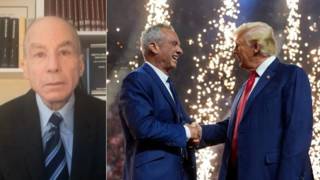
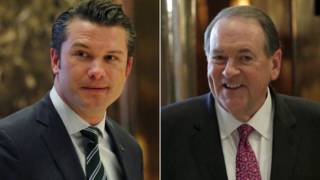

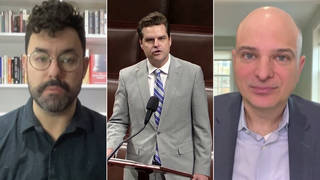





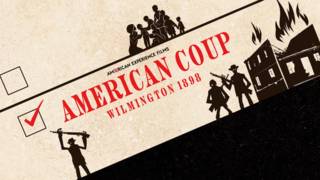
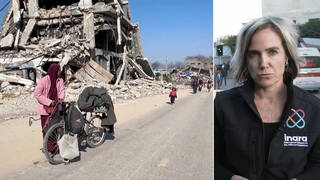
Media Options